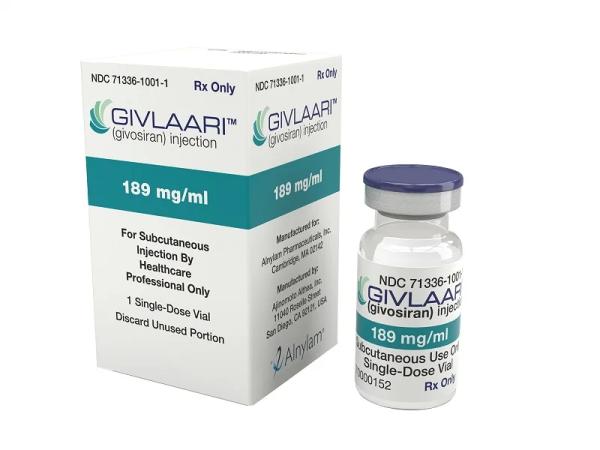Givosiran Side Effects
Medically reviewed by Drugs.com. Last updated on Apr 27, 2025.
Applies to givosiran: subcutaneous solution.
Precautions
Your doctor will check your progress closely while you are receiving this medicine. This will allow your doctor to see if the medicine is working properly and to decide if you should continue to receive it. Blood tests may be needed to check for unwanted effects.
This medicine may cause serious allergic reactions, including anaphylaxis, which can be life-threatening and require immediate medical attention. Tell your doctor right away if you have a rash, itching, trouble breathing, trouble swallowing, or any swelling of your hands, face, or mouth while you are using this medicine.
Check with your doctor right away if you have pain or tenderness in the upper stomach, pale stools, dark urine, loss of appetite, nausea, vomiting, or yellow eyes or skin. These could be symptoms of a serious liver problem.
Check with your doctor right away if you have bloody urine, a decrease in frequency or amount of urine, an increase in blood pressure, increased thirst, loss of appetite, lower back or side pain, nausea, swelling of the face, fingers, or lower legs, trouble breathing, unusual tiredness or weakness, vomiting, or weight gain. These could be symptoms of a serious kidney problem.
Call your doctor right away if you have redness, burning, swelling, or pain at the injection site.
This medicine may increase homocysteine (an amino acid) levels in your blood. You may receive vitamin supplements (eg, vitamin B6 supplement) to treat this blood problem.
Do not take other medicines unless they have been discussed with your doctor. This includes prescription or nonprescription (over-the-counter [OTC]) medicines and herbal or vitamin supplements.
Serious side effects of givosiran
Along with its needed effects, givosiran may cause some unwanted effects. Although not all of these side effects may occur, if they do occur they may need medical attention.
Check with your doctor or nurse immediately if any of the following side effects occur while taking givosiran:
More common side effects
- agitation
- blood in the urine
- confusion
- dark urine
- decreased urine output
- depression
- dizziness
- headache
- irritability
- lethargy
- loss of appetite
- muscle twitching
- nausea or vomiting
- stomach pain
- stupor
- swelling of the face, ankles, or hands
- unusual tiredness or weakness
- yellow eyes or skin
Rare side effects
- chest tightness
- cough
- difficulty swallowing
- dizziness
- fast heartbeat
- hives, itching, or skin rash
- puffiness or swelling of the eyelids or around the eyes, face, lips, or tongue
- trouble breathing
Other side effects of givosiran
Some side effects of givosiran may occur that usually do not need medical attention. These side effects may go away during treatment as your body adjusts to the medicine. Also, your health care professional may be able to tell you about ways to prevent or reduce some of these side effects.
Check with your health care professional if any of the following side effects continue or are bothersome or if you have any questions about them:
More common side effects
- bleeding, blistering, burning, coldness, discoloration of the skin, feeling of pressure, hives, infection, inflammation, itching, lumps, numbness, pain, rash, redness, scarring, soreness, stinging, swelling, tenderness, tingling, ulceration, or warmth at the injection site
See also:
For healthcare professionals
Applies to givosiran: subcutaneous solution.
General adverse events
The most commonly reported adverse reactions included fatigue, injection site reactions, and nausea.[Ref]
Dermatologic
- Very common (10% or more): Rash (17%)[Ref]
Rash included eczema, erythema, pruritus, pruritic rash, and urticaria.[Ref]
Gastrointestinal
- Very common (10% or more): Nausea (27%)
- Postmarketing reports: Acute pancreatitis[Ref]
Hepatic
- Very common (10% or more): Increased ALT (14.6%), transaminase elevations (13%)[Ref]
Hypersensitivity
- Uncommon (0.1% to 1%): Anaphylactic reaction, hypersensitivity[Ref]
In clinical trials, one patient experienced an anaphylactic reaction, and one patient experienced a hypersensitivity reaction.[Ref]
Immunologic
- Uncommon (0.1% to 1%): Treatment emergent antidrug antibodies[Ref]
In clinical study, one patient developed treatment emergent antidrug antibodies during treatment.[Ref]
Local
- Very common (10% or more): Injection site reactions (up to 36%)
- Frequency not reported: Injection site erythema, injection site pain, injection site pruritus[Ref]
Metabolic
- Very common (10% or more): Increased blood homocysteine (16%)[Ref]
Increased blood homocysteine included abnormal blood homocysteine and hyperhomocysteinemia.[Ref]
Other
- Very common (10% or more): Fatigue (10%)[Ref]
Renal
- Very common (10% or more): Increase serum creatinine (15%)[Ref]
Increased serum creatinine included chronic kidney disease (decreased estimated GFR), decreased glomerular filtration rate, renal impairment, and increased blood creatinine.[Ref]
References
1. (2019) "Product Information. Givlaari (givosiran)." Alnylam Pharmaceuticals
2. (2023) "Product Information. Givlaari (givosiran)." Alnylam Australia Pty Ltd
3. (2024) "Product Information. Givlaari (givosiran)." Alnylam Pharmaceuticals
More about givosiran
- Check interactions
- Compare alternatives
- Dosage information
- During pregnancy
- Drug class: miscellaneous metabolic agents
- En español
Patient resources
Other brands
Professional resources
Other brands
Related treatment guides
Further information
Givosiran side effects can vary depending on the individual. Always consult your healthcare provider to ensure the information displayed on this page applies to your personal circumstances.
Note: Medication side effects may be underreported. If you are experiencing side effects that are not listed, submit a report to the FDA by following this guide.

